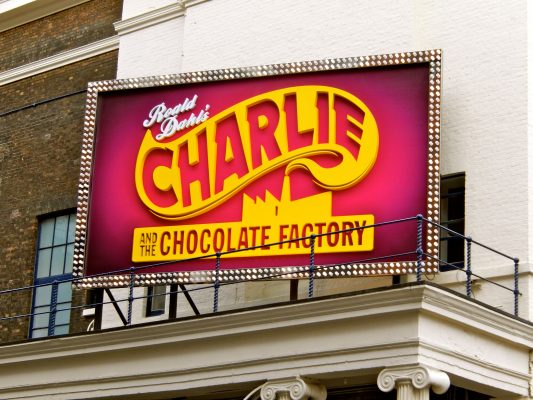Born to be Wild(er): The Willy Wonka Effect
“Charlie and the Chocolate Factory” opens this spring on Broadway. (PHOTO COURTESY OF SARAH ACKERMAN VIA FLICKR)
September 29, 2016
“Do you ask a fish how it swims? Or a bird how it flies? No siree, you don’t. They do it because they were born to do it.” —The Candy Man, “Willy Wonka and the Chocolate Factory,” 1971.
Beloved actor Gene Wilder passed away on Aug. 29, 2016. In the wake of this loss we are prompted to think on his legacy, on the times he made us laugh, brought our families together and warmed our hearts. One of Wilder’s best known roles is that of the enigmatic chocolatier, Willy Wonka. Wonka first appeared in the 1964 novel “Charlie and the Chocolate Factory” by Roald Dahl. Since then, Wonka has appeared in a sequel to the book, two films, and a musical based off of the original novel. The musical, also titled “Charlie and the Chocolate Factory,” has been playing on the West End in London; however, it will be coming to Broadway in spring of 2017.
“Charlie and the Chocolate Factory,” in all of its retellings and adaptations, is considered a classic rags to riches story. Charlie Bucket begins his journey as an impoverished child, but through virtue, effort and a little bit of luck, is rewarded with ownership of Wonka’s factory. The cyclical revivals of the “Chocolate Factory” story indicate how the American dream continues to thrive in the hearts and minds of each new generation. Dahl’s original message continues to resonate with each new adaptation of his story. The message is not simply to work hard and the world will fall into your lap— although Charlie Bucket is the protagonist, it is the other four winners of Golden tickets who hold the key to the meaning of Dahl’s tale.
The “Chocolate Factory” stories are praised for a particular aspect of their brilliance: despite being a story about children, the characters are all treated as adults. By giving children the spotlight, Dahl also gave them the responsibilities of adulthood. It is the children who win entry into the factory; the children whose actions determine whether or not they can stay in the factory; the children who are considered potential successors to the factory. Each child disqualified from the competition could not manage their responsibility: Augustus could not control his greed, Veruca could not control her envy, Violet could not control her pride, and Mike could not control his sloth. As these children act on their flaws and are punished accordingly, audiences are learning valuable lessons about what it means to truly be mature. “Rags-to-riches” makes the process sound too simple; the chocolate factory teaches that wealth takes work, not only physical effort but also emotional maturity.
While the children in the story are held to the standards of adulthood, perhaps the most childish character of all is Mr. Wonka himself. Wonka constantly speaks in riddles, sings and dances, and as the 1971 film puts it, lives in his own “world of pure imagination.” In this, Dahl has woven a beautiful lesson: children experiencing the story are learning the value of maturity, while adults are learning the value of innocence. These messages resonate with audiences of all ages, explaining the amazing success of each new adaptation of Dahl’s story.
Wonka’s lesson is not simply to remember to live light-heartedly as we grow up; past all of his eccentricities, Wonka is teaching us about legacy. We are remembered by what we leave behind, whether it be a chocolate empire or a collection of films. Life is not about growing up quickly, or trying to stay young forever: life is about creating something meaningful. Dahl touched the world with his story; Wonka touched the world with his chocolate; Wilder touched the world with his performances. We are survived by the lessons we teach and stories we tell. We are all born to do something, and people like Dahl, Wonka and Wilder teach us the magic of doing it, whatever it is, extraordinarily.










